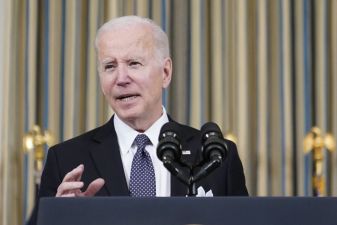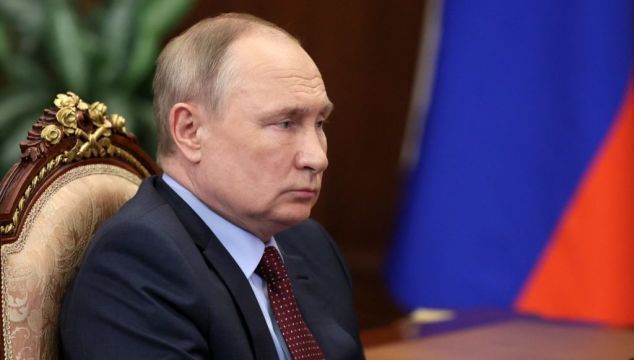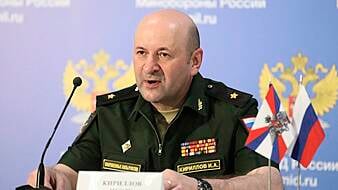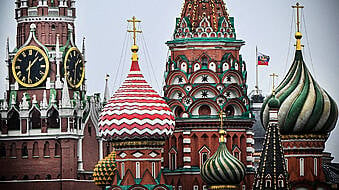What you need to know right now:
- Ukraine and Russia are preparing for their first face-to-face peace talks in more than two weeks, with Kyiv insisting it will make no concessions on ceding territory as battlefield momentum has shifted in its favour.
- Russia and Ukraine both confirmed their delegations would arrive in Turkey on Monday ahead of the start of another round of peace talks in Istanbul on Tuesday.
- The Kremlin said Joe Biden's remark that Vladimir Putin "cannot remain in power" was a cause for alarm, in a measured response to a public call from the US president for an end to the Russian leader's 22-year rule.
- Ukraine sees no signs on the ground that Russia has given up a plan to surround the capital Kyiv, Ukrainian defence ministry spokesperson Oleksander Motuzyanyk said.
- The UN human rights office said 1,119 civilians had been killed and 1,790 wounded since Russia began its attack on Ukraine.
- Russia is working out methods for accepting payments for its gas exports in roubles and it will take decisions in due course should European countries refuse to pay in the Russian currency, the Kremlin said.
Ukraine and Russia were preparing on Monday for the first face-to-face peace talks in more than two weeks, but a senior US official said Russian President Vladimir Putin did not appear ready to make compromises to end the war.
Ukraine's foreign minister said a ceasefire was the most his country could hope for from the talks, due to be held in Istanbul on Tuesday after Turkish President Tayyip Erdogan spoke to Russia's Vladimir Putin on Sunday.
"We are not trading people, land or sovereignty," Dmytro Kuleba said.
A report that Russian billionaire and mediator Roman Abramovich and Ukrainian peace negotiators had suffered symptoms of suspected poisoning after a meeting in Kyiv this month underlined the tension over the talks.
The Wall Street Journal and the investigative outlet Bellingcat cited people familiar with the matter for their reports but Ukraine poured cold water on them and a US official said the cause of the symptoms was environmental, not poison.
In besieged Ukrainian cities where conditions are desperate, the threat of Russian attacks blocked exit routes for civilians, two Ukrainian officials said, including the devastated port of Mariupol whose mayor said 160,000 people were still trapped.
They've not been able to take the city, so they've decided to destroy it
But the United Nations said it had been able to bring food and medical supplies into Kharkiv, Ukraine's second-biggest city and one of its hardest hit.
A pre-dawn missile blew out the wall of a Kharkiv school.
"They've not been able to take the city, so they've decided to destroy it," said Oleksandr, sweeping rubble out of a third-storey classroom after spending the night with his mother on a lower floor because their own neighbourhood had been hit.
The mayor of Irpin, near Kyiv, said Ukrainian forces were back in full control and a US defence official said the Ukrainians had recaptured the eastern town of Trostyanets, south of Sumy and were continuing to try to take back ground.
Russia's defence ministry, for its part, said its troops had destroyed ammunition depots in the Zhytomyr region west of Kyiv and had hit 41 Ukrainian military sites in the past 24 hours. Reuters could not immediately verify any of the reports.
'Change their goals'
Tuesday's talks will be the first in person since an acrimonious meeting between foreign ministers on March 10th, a sign of shifts behind the scenes as Russia's invasion has stalled and sanctions have hit home.
"We have destroyed the myth of the invincible Russian army. We are resisting against the aggression of one of the strongest armies in the world and have succeeded in making them change their goals," Kyiv Mayor Vitali Klitschko said.
He said 100 people had been killed in the capital, including four children, and 82 multi-storey buildings had been destroyed. It was not possible to verify the figures.
Russia's military signalled last week it would concentrate on expanding territory held by separatists in eastern Ukraine, but Ukraine said it saw no sign Russia had given up a plan to surround the capital, which it targeted in its February 24th invasion.
Ukrainian officials had suggested Russia could be more willing to compromise having seen stiff Ukrainian resistance and heavy Russian losses. But a senior US State Department official said Putin did not give that impression.
"Everything I have seen is he is not willing to compromise at this point," the official told Reuters on condition of anonymity, after Ukraine's president sketched out a potential way to end the crisis over the weekend.
When the sides last met in person, Ukraine accused Russian Foreign Minister Sergei Lavrov of ignoring pleas to discuss a ceasefire, while Lavrov said a halt to fighting was not even on the agenda.
Since then, they have held talks via video link and publicly discussed a formula under which Ukraine might accept some kind of formal neutral status. But neither side has budged over Russia's territorial demands, including Crimea, which Moscow seized and annexed in 2014, and eastern territories known as the Donbas, which Moscow demands Kyiv cede to separatists.
"I don't think there will be any breakthrough on the main issues," Ukrainian interior ministry adviser Vadym Denysenko said.
Turkey's president Erdogan, however, was more upbeat, reporting progress in telephone calls with Putin and Ukrainian President Volodymyr Zelenskiy.
Biden call 'alarming'
The Kremlin said Biden's surprise comment about Putin at the end of a speech in Warsaw at the weekend, "For God's sake, this man cannot remain in power" was "certainly alarming" after earlier saying it was up to Russians to choose their leader.
On Sunday Biden said he was not calling for regime change.
Russia calls its actions in Ukraine a "special military operation" to disarm and "denazify" its neighbour. Kyiv and the West consider this a pretext for an unprovoked invasion to try to topple the elected Ukrainian government.
British Foreign Secretary Liz Truss said talks should not end up "selling Ukraine out", noting the "uneasy settlement" which left it vulnerable after Russia annexed Crimea in 2014.
"We need to ensure that Putin can never act in this aggressive way again. Any long term settlement needs to include a clear sanctions snapback, which would be triggered automatically by any Russian aggression," she told parliament.
Last week, Ukrainian forces pushed Russian troops back in areas around Kyiv, the northeast and the southwest, while Russia kept up pressure in the southeast near separatist areas, including its devastating siege of Mariupol.
Mayor Vadym Boichenko, speaking from an undisclosed location outside the city, said 26 buses were waiting to evacuate some of 160,000 trapped civilians but Russia was denying safe passage.
"People are beyond the line of humanitarian catastrophe," Boichenko said on national television. "We need to completely evacuate Mariupol." A spokesperson for Boichenko said later that nearly 5,000 people had been killed and 90 per cent of buildings damaged, of which 40 per cent were destroyed.

Deputy Prime Minister Iryna Vereshchuk said intelligence reports of possible Russian "provocations" along evacuation routes out of besieged cities meant there were no plans for such evacuations on Monday.
Elsewhere, Russia's armoured columns are bogged down, with trouble resupplying and making little or no progress.
Britain's defence ministry said there had been no major change in Russia's positions in the past 24 hours, with most Russian gains near Mariupol and heavy fighting under way there.
"As of today, the enemy is regrouping its forces, but they cannot advance anywhere in Ukraine," Ukrainian Deputy Defence Minister Hanna Malyar said.







